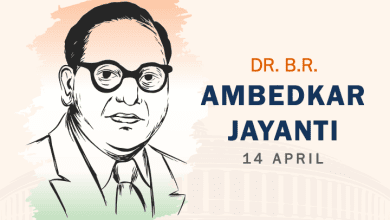Ganesh Chaturthi: A Celebration of Faith and an Opportunity for Mental Health Awareness

Ganesh Chaturthi, one of the most widely celebrated festivals in India, is a time of joy, devotion, and cultural unity. It marks the birth of Lord Ganesha, the elephant-headed deity revered as the remover of obstacles, the god of wisdom, and the patron of arts and sciences.
While the festival is traditionally associated with religious rituals and vibrant festivities, it also offers a unique opportunity to reflect on deeper psychological themes, particularly those related to mental health. In recent years, the celebration of Ganesh Chaturthi has begun to intersect with initiatives aimed at promoting mental health awareness, especially by addressing inner conflicts that many individuals face.
What is Ganesh Chaturthi?
Ganesh Chaturthi is a ten-day festival that typically falls in the Hindu month of Bhadrapada, which usually corresponds to August or September in the Gregorian calendar. The festival begins with the installation of clay idols of Lord Ganesha in homes and public spaces, accompanied by prayers, music, and offerings. The rituals culminate on the tenth day, known as Anant Chaturdashi, when the idols are immersed in water bodies in a ceremony called Visarjan.
The significance of Lord Ganesha lies in his symbolism. His large ears signify the importance of listening, his small eyes represent concentration, and his trunk, which can pick up anything, symbolizes adaptability. His wisdom is not only about intelligence but also about understanding and managing life’s challenges, including those related to mental well-being.
The Intersection of Ganesh Chaturthi and Mental Health
In recent years, there has been a growing recognition of the need to address mental health issues within the framework of cultural and religious practices. Ganesh Chaturthi, with its emphasis on overcoming obstacles, provides a fertile ground for fostering mental health awareness, particularly by addressing the inner conflicts that individuals face. These inner conflicts often manifest as stress, anxiety, depression, and other mental health challenges.
- Inner Conflicts and Lord Ganesha’s Symbolism
The mythology surrounding Lord Ganesha offers profound insights into the nature of inner conflicts. One of the most popular stories is that of Lord Ganesha’s creation by Goddess Parvati, and his subsequent decapitation and resurrection by Lord Shiva.
This story can be interpreted as a metaphor for the internal struggles we face, the feelings of being “cut off” from our true selves, and the potential for renewal and healing.
Ganesha’s role as the remover of obstacles can be seen as a guiding principle for addressing inner conflicts. Just as Ganesha is invoked to remove physical and external obstacles, he can also be invoked to help individuals navigate the emotional and psychological barriers that hinder their mental well-being.
By reflecting on Ganesha’s qualities—wisdom, adaptability, and strength—individuals can find inspiration to confront and resolve their inner conflicts. - Creating Mental Health Awareness Through Rituals and Community Involvement
The rituals associated with Ganesh Chaturthi offer opportunities to promote mental health awareness. For example, the process of bringing a Ganesha idol into one’s home can be seen as a symbolic act of inviting positive energy and mental clarity into one’s life.
During the festival, many communities organize public discussions, workshops, and cultural programs that can be tailored to include themes related to mental health.
Community involvement during Ganesh Chaturthi also plays a crucial role in creating a supportive environment for mental health. The collective celebration, where people from different walks of life come together, can foster a sense of belonging and reduce feelings of isolation, which are often associated with mental health issues.
By participating in group activities, individuals can experience the therapeutic benefits of social connection and shared purpose. - Promoting Self-Reflection and Emotional Healing
Ganesh Chaturthi is also a time for self-reflection, which is essential for mental health. The rituals of prayer, meditation, and devotion allow individuals to pause and reflect on their lives, their challenges, and their inner conflicts. This period of introspection can be a powerful tool for emotional healing.
For example, the act of immersing the Ganesha idol during Visarjan can be viewed as a symbolic release of negative emotions and inner conflicts. As the idol is immersed in water, individuals can mentally and emotionally let go of their burdens, experiencing a sense of renewal and peace.
This ritual can serve as a reminder of the importance of acknowledging and addressing one’s mental health issues. - Leveraging Cultural Narratives for Mental Health Education
The stories and teachings associated with Lord Ganesha can be used to educate people about mental health in a culturally relevant way. For instance, the story of Ganesha writing the Mahabharata underlines the importance of perseverance and focus—qualities that are essential for mental resilience.
By connecting these narratives to modern mental health concepts, educators and mental health professionals can make the subject more relatable and accessible to diverse audiences.
Cultural narratives can also help destigmatize mental health issues. In many cultures, mental health is often a taboo subject, shrouded in stigma and misunderstanding. By embedding mental health messages within the familiar and respected context of Ganesh Chaturthi, it becomes easier to initiate conversations about mental well-being and encourage individuals to seek help when needed.
Conclusion
Ganesh Chaturthi, with its rich symbolism and community-oriented celebrations, provides a unique platform for promoting mental health awareness. By addressing inner conflicts and leveraging the cultural significance of the festival, we can foster a deeper understanding of mental health and encourage a more compassionate and supportive approach to mental well-being.
As we celebrate Ganesh Chaturthi, let us also take the opportunity to reflect on our mental health, address our inner conflicts, and support those around us in their journey towards mental wellness.

CEO ICHARS,
Author Destiny of Choice






